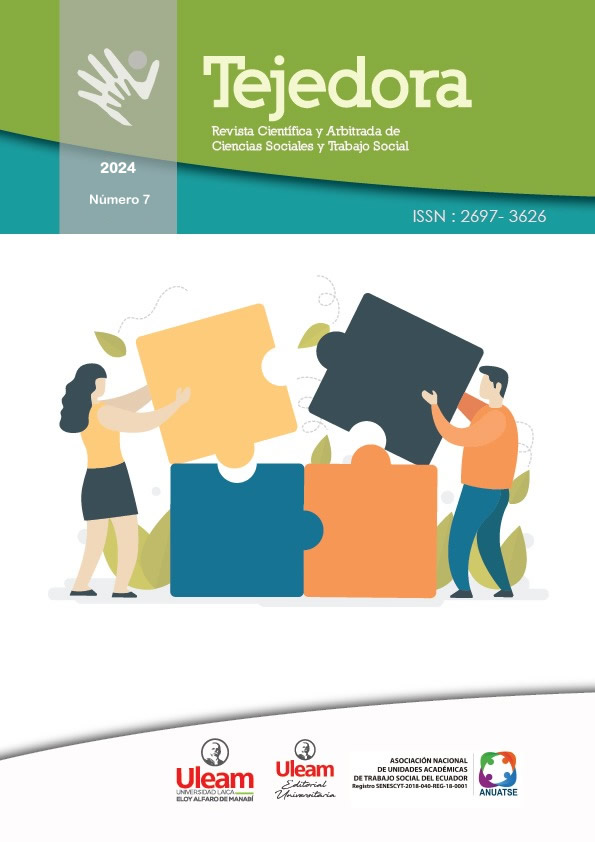PERSONAL METACOGNITION AND ITS IMPACT ON THE VOCATIONAL AWAKENING OF UNIVERSITY STUDENTS 2023
DOI:
https://doi.org/10.56124/tj.v7i16.006Keywords:
Artistic creation, art critic, comparative evaluation, metacognitionAbstract
The present study aims to determine personal metacognition and its impact on the sensory vocation of university students majoring in visual arts at ULEAM 2023. To achieve this, a descriptive quantitative methodology was used through non-probabilistic sampling of a homogeneous population by defining variables and conducting surveys on eForms. The survey results show that university students' decision-making about their own abilities and talents contributes to a 53.19% improvement in their learning; reflection on learning tools contributes to a 55.31% achievement in learning; the ability to apply other strategies contributes to intelligence in different situations by 46.8%. The main conclusion establishes that metacognition allows for the development of a personal mode of learning and cognitive development back and forth on and from references.
Downloads
References
Barrio, S., Orduño, B., Rodríguez, S., & Castillo, M. (2023). Abordaje neuropsicológico en una unidad pediátrica de daño cerebral adquirido del sistema público de salud. Neurología (English Edition), 38(1), 8-14. Obtenido de https://www.sciencedirect.com/science/article/pii/S0213485320301274?ref=pdf_download&fr=RR-2&rr=85146b7f8835a9d9
Castañera, L. (2013). Career Choice: Between Vocation and Institutional Offerings. Revista de Educación y Desarrollo. Obtenido de https://www.researchgate.net/profile/Liliana-Castaneda-2/publication/265643101_Career_Choice_Between_Vocation_and_Institutional_Offerings/links/541754de0cf2218008bee38d/Career-Choice-Between-Vocation-and-Institutional-Offerings.pdf
Castro, J., Mora, M., & Hernández, C. (2020). Configuración del nivel de apropiación metacognitiva de conocimientos pedagógicos en la formación inicial docente. Praxis Educativa, 24(3), 1-17. Obtenido de https://dx.doi.org/10.19137/praxiseducativa-2020-240307
Chávez, A., Guido, F., & Mallory, S. (2003). Learning to Value the "Other": A Framework of Individual Diversity Development. Journal of College Student Development, 453-469. Obtenido de https://muse.jhu.edu/pub/1/article/44579/summary
Congreso Nacional. (2008). Constitución de la República del Ecuador. Quito, Ecuador. Obtenido de https://www.oas.org/juridico/pdfs/mesicic4_ecu_const.pdf
Constitucion De La Republica Del Ecuador. (2008). Articulo 3, 71. Quito, Ecuador: Asamblea Nacional .
Contreras, W. (2018). la regulación metacognitiva en la resolución de problemas matemáticos. Universidad Autónoma de Manizales. Obtenido de https://repositorio.autonoma.edu.co/bitstream/11182/861/1/Regulaci%C3%B3n_metacognitiva_resoluci%C3%B3n_problemas_matem%C3%A1ticos.pdf
La Organización de las Naciones Unidas para la Educación, la Ciencia y la Cultura (UNESCO). (2015). La Agenda 2030 para el Desarrollo Sostenible. París. Obtenido de https://es.unesco.org/creativity/sites/creativity/files/247785sp_1_1_1.compressed.pdf
Manzo, Á. (2021). Vocación, educación y contextos. Educación y Amazonía: Formación, experiencias y relatos de vida, 21. Obtenido de https://www.academia.edu/12833797/Los_ojos_de_la_pielmazon%c3%ada-Formaci%c3%b3n-experiencias-y-relatos-de-vida-19-31.pdf
MINISTERIO DE CULTURA Y PATRIMONIO DEL ECUADOR. (2014). Ecuador, territorio de las Artes y Creatividades 2014 – 2017. SUBSECRETARÍA DE ARTES Y CREATIVIDAD. Obtenido de https://contenidos.culturaypatrimonio.gob.ec/wp-content/uploads/Ecuador-Territorio-de-las-Artes.pdf
Morales, L. (2019). Relación entre las estrategias metacognitivas y la motivación académica con el rendmimiento académico en los estudiantes de una escuela de Ingeniería Industrial. Universidad Privada Antenor Orrego. Obtenido de https://repositorio.upao.edu.pe/bitstream/20.500.12759/5068/1/REP_MAEST.EDU_LENA.MORALES_RELACI%c3%93N.ESTRATEGIAS.METACOGNITIVAS.MOTIVACI%c3%93N.ACAD%c3%89MICA.RENDIMIENTO.ACAD%c3%89MICO.ESTUDIANTES.ESCUELA.INGENIER%c3%8dA.INDUSTRIAL.pdf
ONU, O. d. (2015). La ONU incluye los derechos de los animales en sus objetivos para 2030 . Canada: Objetivos para el desarrollo sostenible ONU.
Pallasmaa, J. (2010 ). Los ojos de la piel. La arquitectura en todos los sentidos. Gustavo Hill, 156. Obtenido de https://www.academia.edu/44863141/Los_ojos_de_la_piel_Juhani_Pallasmaa
Senplades. (10 de Octubre de 2017). Plan Nacional de Desarrolllo 2017 - 2021. Obtenido de https://www.planificacion.gob.ec/wp-content/uploads/downloads/2017/10/PNBV-26-OCT-FINAL_0K.compressed1.pdf
Soloaga, M., Córdoba, P., & Torres, S. (2019). Evaluación de la asimilación cognitiva de conceptos básicos de microbiología en alumnos de Bioquímica y Farmacia. Revista Educación Médica, 20(1), 8-14. Obtenido de https://www.sciencedirect.com/science/article/pii/S1575181318300585?ref=pdf_download&fr=RR-2&rr=85147aaa8f53a9d9
Watts, R. (1992). Elements of a Psychology of Human Diversity. Journal of Community Psychology, 20(2), 116-131. Obtenido de https://www.researchgate.net/publication/227778618_Elements_of_a_psychology_of_human_diversity
Wells, A. (2000). Emotional disorders and metacognition: Innovative cognitive therapy. John Wiley & Sons
Published
How to Cite
Issue
Section
License
Copyright (c) 2024 Revista Científica y Arbitrada de Ciencias Sociales y Trabajo Social: Tejedora. ISSN: 2697-3626

This work is licensed under a Creative Commons Attribution-NonCommercial-ShareAlike 4.0 International License.






















